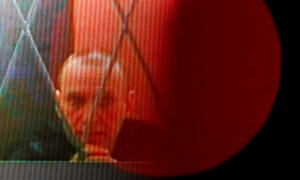|
Wearing a black prison uniform and standing behind bars in a
small, bare room, Navalny, 47, appeared gaunt but spoke
animatedly, at length and without notes.
At one point he said some prison directors were "malicious
people and fascists, lunatics", drawing a rebuke from judge Oleg
Nefyodov.
It was the second day running that Navalny had taken part in
legal hearings from the Arctic "Polar Wolf" penal colony, one of
Russia's harshest, to which he was transferred last month after
his cumulative sentences were extended to more than 30 years.
Navalny said prison rules limiting inmates to one book at a time
meant that someone who chose to have a Bible or a Koran could
not have any other religious or secular literature, including
newspapers or magazines.
"One book is not enough for me. It clearly violates my religious
rights," he said.
He also argued that meal breaks were too short.
"I get two mugs of boiling water and two pieces of disgusting
bread. I want to drink this boiling water normally and eat this
bread. I have 10 minutes to eat. And I am forced to choke on
this boiling water," he said.
His arguments prompted a detailed discussion with Nefyodov and a
representative of the justice ministry on prison libraries, meal
arrangements and cell furnishings. Both his complaints were
rejected, independent Russian news site Mediazona said.
Navalny has frequently used such hearings in the past as a means
of defying the authorities, demonstrating his resilience and
maintaining a link to the outside world despite the harsh
conditions of his imprisonment.
He and his supporters say the many charges against him, ranging
from fraud to extremism, were trumped up to silence his
criticism of President Vladimir Putin. Human rights groups and
Western governments regard him as a political prisoner.
The Kremlin makes a point of not speaking his name and says he
is a convicted criminal whose treatment is a matter for the
prison system.
(Reporting by Filipp Lebedev and Mark TrevelyanEditing by Gareth
Jones)
[© 2023 Thomson Reuters. All rights
reserved.]
Copyright 2022 Reuters. All rights reserved. This material may
not be published, broadcast, rewritten or redistributed.
Thompson Reuters is solely responsible for this content.

|
|




